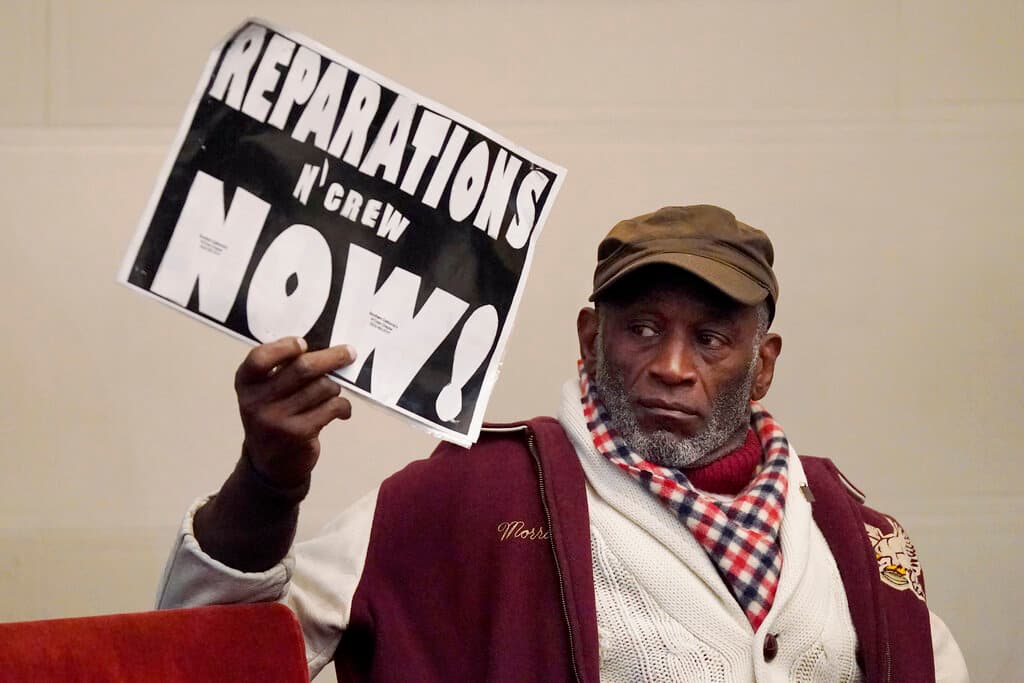St. Louis Inching Closer Towards Reparations as City Commission Calls for ‘Direct Cash Payments,’ Public Apology
The commission’s final report was released as cities across the country are considering reparations, and as Vice President Harris this week doubled down on her support for studying them.

St. Louis could be one step closer to paying reparations after the city’s commission, established by the mayor, released its final report of recommendations, which calls for direct cash payments of up to $25,000 for certain residents, a public apology, and an array of other reparations measures for descendants of slaves and Black residents affected by racism.
The report, delivered after 18 months of deliberations by the commission, says it aims to provide “a clear and detailed path toward addressing the racial injustices that have plagued the city for centuries” and says it is a “call to action” for the city to recognize its responsibility and start building a more “inclusive future.”
Its release comes as cities and states across the country are studying or advancing reparations efforts, including Chicago, Detroit, Boston, California, and New York. Vice President Harris, in an interview with radio host Charlamagne Tha God on Tuesday, expressed support for studying reparations — a topic she has largely tried to steer clear of in the presidential race despite her previous support as senator for a federal bill that aimed to establish a reparations commission.
“On the point of reparations, it has to be studied. There’s no question about that, and I’ve been very clear about that position,” she said on Tuesday. Ms. Harris has been seeking to shore up the Black vote, with recent New York Times/Siena College polling of likely Black voters indicates that only 78 percent of respondents are backing Ms. Harris — a significant drop from President Biden’s 90 percent support rate in 2020.
Following the interview, President Trump bashed her reparations stance, calling Ms. Harris a “radical liberal” and saying that eventual reparations programs could cost trillions of dollars.
The idea of reparations is an unpopular one with the public, Pew Research polling indicates, with only 30 percent of American adults saying they support giving land or money to slave descendants. Support for slavery reparations varies widely by race, the polling showed, with 77 percent of Black Americans supporting them while only 18 percent of white Americans approving them.
The lack of support has not appeared to stop cities from pressing ahead with their reparations efforts, and as St. Louis becomes the latest one to do so, its commission has proposed creating a permanent City Reparations Committee to oversee the “implementation of recommendations” made in the report.
The commission is advising the city to give “direct cash payments to individuals who can trace their ancestry to enslaved people and to Black residents who have been disproportionately impacted by systemic racism in St. Louis.” It advises that the cash payments should be delivered in ways to maximize “wealth-building opportunities” and advises offering tax exemptions on reparations compensation.
The report does not list specific funding for the payments, nor does it lay out eligibility requirements. It instead calls for the permanent reparations committee, if established, to come up with a “transparent and equitable system for determining eligibility and amounts of compensation.”
It does, however, call for specific $25,000 payments to be made for Black residents subjected to “specific historical harms,” including former residents or descendants of several housing projects and neighborhoods in the city.
The commission says that a public apology for slavery and systemic harms inflicted on Black people will be a “critical first step” in the reparations process and will not only recognize the past but provide “a commitment to a more just future” and “lay the foundation for restorative policies that promote healing and equity.”
Among a slew of wide-ranging proposals in the report are calls for the city to fund efforts to preserve Black landmarks, increase access to public parks and green spaces in largely-Black neighborhoods, and provide scholarships and housing grants for descendants.
The commission said it had delivered its recommendations to the city’s mayor, Tishaura Jones, whose office did not immediately return a request for comment from the Sun.

